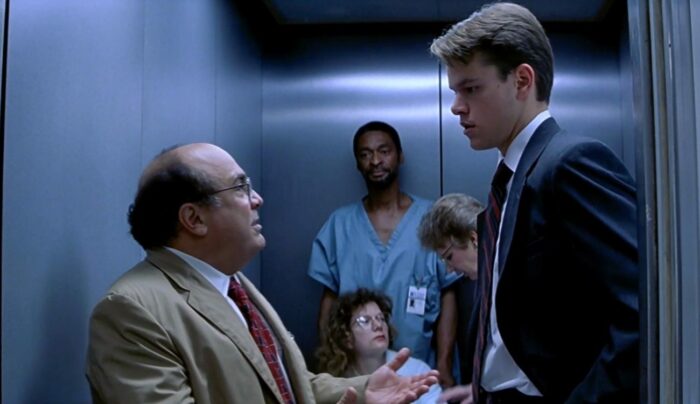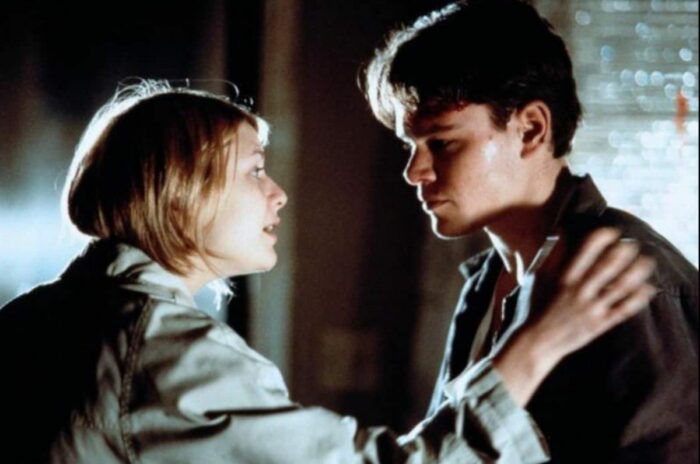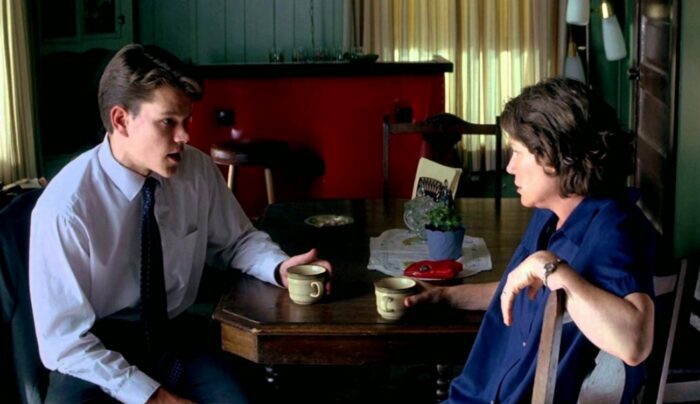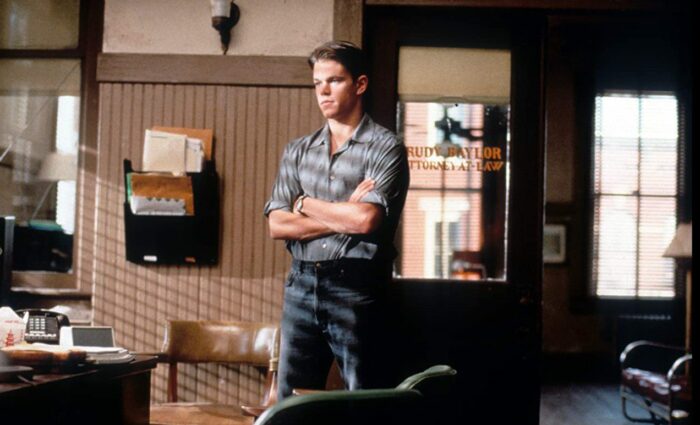This very writer wonders, 25 years later, how The Rainmaker didn’t become a bigger hit. John Grisham was the hottest novelist on the planet. Movies based on his novels carried a nearly automatic Midas Touch. Critics scored it higher than any Grisham film adaptation before it or since, and the renowned author called it the best one that has ever been made from his work. Moreover, it would be nominated less than a decade later by the American Film Institute for consideration of inclusion as one of the Top 10 courtroom dramas of all-time.
That’s the exterior shine. Look inside the vehicle further. The Rainmaker captured Matt Damon’s rising star for the lead role and surrounded him with solid pedigree from top to bottom, including the renowned Francis Ford Coppola in the director’s chair. It should not have mattered that Coppola was coming off of the critical bomb of Jack the year before or that this movie was released mere weeks before the Good Will Hunting launching pad for Damon. Audiences should have taken notice early or found it soon after.
Pull all of that together in one sentence: The Rainmaker was helmed by a historic creator, starred the “next big thing” actor, showered with universal critical praise, and boasted name recognition source material known to consistently deliver quality entertainment. To read it like that and see a lack of remembrance and legacy is baffling. For those folks who have never seen it or maybe even never heard of it other than as an early career footnote for Matt Damon, you’re missing a real legitimate treat.

Damon plays good-hearted Memphis State Law School grad Rudy Baylor. The hometown boy paid for college by tending bar on the seedier side of Blues City where his rookie eagerness and moldable naivety nets him a job working for J. Lyman Stone (Mickey Rourke, stepping way up from Double Team the year before), better known to the neighborhood as “Bruiser.” Stone’s lead paralegal Deck Shifflet (L.A. Confidential’s Danny DeVito) shows Rudy the ambulance-chasing ropes of nabbing leads for signed commitments and quick out-of-court settlements. Through personal initiative jumping away from federal investigations against Bruiser, The Rainmaker has Rudy and Deck go it alone with only three potential clients.
The first is drawing up a will for an sweet old woman named Miss Birdie (Mrs. Miniver’s Teresa Wright, in her final film role) from whom he rents a coach house apartment. The second is supporting an abused wife named Kelly Riker (Claire Danes, fresh from Romeo + Juliet) who’s been admitted to the hospital multiple times due to beatings from her macho softball-playing husband Cliff (Andrew Shue of Melrose Place, getting to play extremely against type). The third is leading an insurance fraud suit on behalf of the family of the leukemia-stricken Donny Ray Black (TV actor Johnny Whitworth).
It’s the latter two of those that fill most of The Rainmaker’s narrative. Rudy takes a protective interest in Kelly’s safety in hopes of getting her out of a bad situation. Meanwhile, the centerpiece courtroom time of Grisham’s novel and Coppola’s film presents the first-timer Rudy pitted solo against Jon Voight’s veteran lawyer Leo F. Drummond. The nefarious suit and his expensive legal team represents the Great Benefit insurance company looking to squash this validity of the potential lawsuit worth millions.

With its fair share of southern charm and old school filmmaking ingredients, The Rainmaker floats like morning mist compared to the thunder-and-lightning storms of other Grisham films. Avoiding the soaring strings of peril and patriotism, Coppola enlisted a fellow legend, composer Elmer Bernstein, to channel his To Kill a Mockingbird work for a calmer tone. Utilizing a fluid Hammond B-Organ, with keys tickled by Michael Lang, the mood couldn’t be more casual or jazzy. Cinematographer John Toll, coming off of two epic Oscar victories for Legends of the Fall and Braveheart, brought his lush-seeking lenses to his second Coppola collaboration after Jack. He captures every autumn leaf and competitive wink of this smaller setting.
The chance to work for Francis Ford Coppola brought out an extremely talented ensemble of actors. Each inspired choice fits their given spot almost perfectly across the board. Today, The Rainmaker cast tallies three Oscar winners (Damon, Wright, Voight) and five nominees (DeVito, Rourke, Virginia Madsen, Dean Stockwell, Roy Scheider). It’s characters beyond those eight that add even more, like the uncredited Danny Glover presiding as the judge, Danes as the damaged love interest, the excellent character actress Mary Kay Place squeezing tear ducts as Donny’s rightfully worrisome mother, and even the near dialogue-less Red West representing the silent detachment and mourning of the film’s themes.
At the time, the greatest unknown on The Rainmaker cast was Matt Damon being granted top-line billing. Coppola gave the then-26-year-old all the latitude to lead, and Damon did not disappoint. Yes, his southern accent may be too weak and his voiceover narration too thick, especially when you add up how many times Damon has narrated in his movies since. However, the actor held the dramatic line effectively to express astute courage and soft empathy where and when it counted. The “it factor” was clear, as were the beginnings of Matt’s shrewd career choices of only working for top directors versus easy paychecks. When his Good Will Hunting buddy Ben Affleck went to Michael Bay’s Armageddon, Damon veered to Spielberg (Saving Private Ryan), John Dahl (Rounders), and Anthony Minghella (The Talented Mr. Ripley). Coppola is a hell of a feather in his cap.

How did this major studio release play on the most screens its November opening weekend only to finish third to a non-Disney animated film (Anastasia) and one of the worst video movies of all-time (Mortal Kombat: Annihilation)? Secondly, how, with critical support and Damon’s supernova of stardom soon after, did it manage to earn more than $10 million less than Jack by the time it finished its run? The film made a smidge over its $40 million budget, but is seen as a disappointment compared to the other Grisham hits made for the same amount that hit well enough at the box office to double or trouble their production costs.
Maybe it was Grisham fatigue. The Rainmaker was the sixth Grisham film in four years, even if Coppola rushed to write the screenplay himself within a year of the book’s release, having read the novel cover-to-cover on a flight. That still counts as over-exposure and over-saturation to a degree.
Maybe it wasn’t thrilling or heavy enough compared to The Firm, The Client, A Time to Kill, and others. Crowds expecting another pressure cooker had to downshift to The Rainmaker’s lighter temperament. The novel and Coppola’s matching movie can quite easily be called the most accessible, calmest, tamest, and most humorous Grisham film. Those easy and winning qualities should have had The Rainmaker getting the kind of basic cable rerun love enjoyed by The Shawshank Redemption with less necessary scrubbing of adult content.

Could it have been too slight? Does DeVito’s trailer-clinching line of “There’s nothing more thrilling than nailing an insurance company” jab too lightly to matter or entice interest. I don’t think so.
Through Rudy’s law school inspiration and the presence of Danny Glover’s Judge Kipler, the civil rights persuasion, spurred by the Memphis location, is very present in an effort to give lawyers a good name away from the usual lawyer jokes that everyone, including Rudy, loves. The Rainmaker, for its own time and still valid today, stands up for the underinsured citizens of lower socioeconomic status who still battle for supportive and affordable healthcare options. The very same can be said for the front-and-center depiction of spousal abuse, another cause that needs every champion it can get.
The events of The Rainmaker remind the Rudy Baylor character of the well-worn lesson that a lawyer is not supposed to become personally involved with his clients. Sure, that’s the ethical center of preference, but the opposite is what the fiction of novels and movies do best. The specialness of interpersonal bonds among The Rainmaker’s characters do not blossom from a cold professional. When Glover’s Judge Kipler tosses the question of “You in over your head, son?” towards Rudy, Damon’s smirking answer of “Absolutely” defines this movie’s attitude. The warm hearts from the crossed lines are what flourish this movie’s sense of justice, grace, and connection. More people need to experience those outcomes from good movies.





Totally agree with Cynthia’s comment.
The book was amazing and movie fell flat. Even if you don’t compare the movie to the book, the movie doesn’t stand on it’s own. If I had not read the book, I think I might have turned the movie off. Most of the relationships are lacking. I can see how hard it would be to condense the content in the runtime of a movie. I wish Netflix would pick this up. It would make for an amazing limited series.
82% of critics disagree with you. As do I. Wonderful movie. Excellent cast and acting. A very good adaptation from a very good book.
Read the rainmaker and loved it
Watched the movie and it is terrible
Why would Grisham allow i to be so bad?
Can’t he write the screenplay?
Or is it just a question of money?